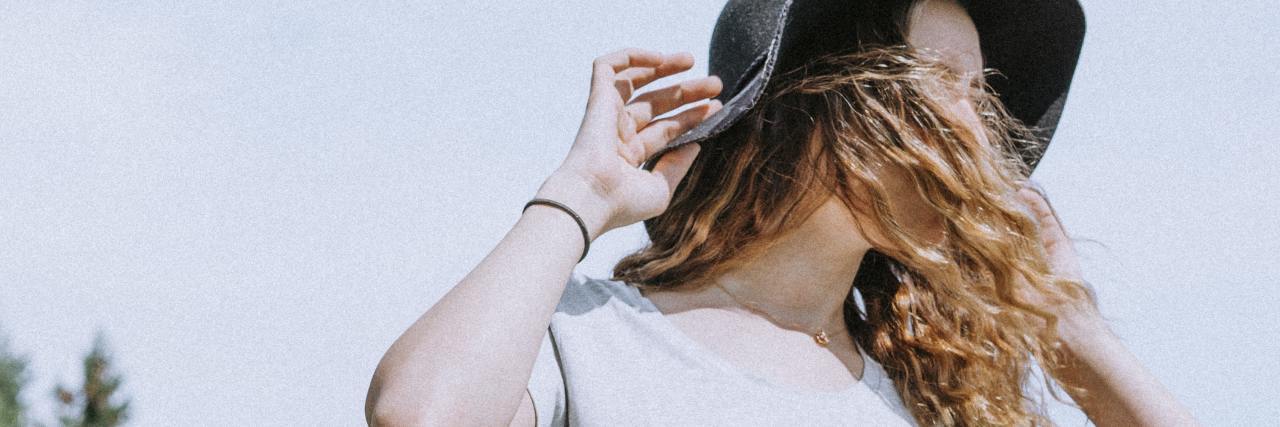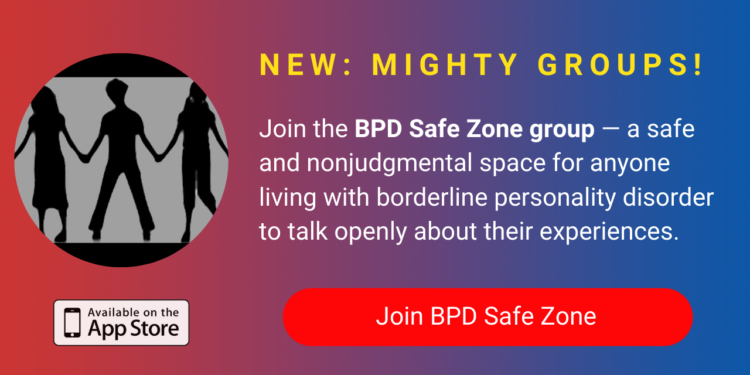Finding Radical Acceptance in the Time of Coronavirus
Editor's Note
If you struggle with self-harm or experience suicidal thoughts, the following post could be potentially triggering. You can contact the Crisis Text Line by texting “START” to 741741. For a list of ways to cope with self-harm urges, visit this resource.
This week (at the time I write this) marked my last week of in-hospitalization outpatient therapy. I couldn’t help but think how symbolic it all was.
A month and a half ago, I stepped out of the “heartbreak hospital” — my term for my time at a psychiatric facility. I was grieving, overwhelmed and lost during the height of the coronavirus (COVID-19) chaos.
I had become attached to outpatient therapy even more so than the heartbreak hospital. Outpatient therapy focused on a much smaller group. This allowed my therapist, Gloria, to understand us on a much deeper level than when I was at the heartbreak hospital. While most outpatients stayed for six weeks, I decided to stay for an additional week. I wanted to learn as much as my insurance would allow. For seven weeks, I had seen Gloria three times a week. I had attended all 21 days of classes. I viewed outpatient therapy the same way I viewed college. It was like taking an intense course on psychology, all the while submerging into the bottom depths of my own mind. I loved processing my thoughts and emotions. Instead of being dazed by my reckless and numbing behaviors, I was trying my best to hold back from my impulsive nature and to submerge myself in the truth of how I really felt. I also loved the never-ending support. I loved the new friends I had made.
For the last few weeks, I had especially gotten to know the other members of group therapy. I was grateful to finally have an all-female group. We were all able to talk more openly, which further strengthened our bond. As I continued to share my thoughts and feelings in the group, one said, “I relate to you so much. Every time you talk, I feel as though your story is the autobiography of my life.”
Hearing that made me feel less “crazy.” Less alone. Gloria noted to all of us, “You are all going through the same emotions and pain. However, instead of feeding off of each other’s negativity, you are all working together to be better. To make changes within yourself.”
For my last week, Gloria wanted to specifically cover for me the topic of radical acceptance. While I had initially heard of radical acceptance on the first day I had arrived at outpatient, the concept was never fully explained until now. Radical acceptance was actually a dialectical behavior therapy (DBT) skill used for those with borderline personality disorder (BPD) but it could essentially be applied to anyone. It was a practice that meant you finally accepted reality for what it was. You don’t get attached to any possible outcome. You realize that everything has a cause. You accept the things that are beyond your control. Although you can still feel pain, you no longer force yourself to suffer.
Suffering was optional. Pain was not.
Life can be worth living even if there are painful events. While there is no timeline to pain, you must live in the here and now and you make the best of what you are given.
I had originally thought that accepting reality was synonymous with giving up. I thought it meant I couldn’t fight for what I believe in. But that’s not what radical acceptance is at all. You can still fight for what you believe in and for what you want. You can let a person know that whatever they did wasn’t fair or not OK. But once you have exhausted all of your options and resources and you finally realize that you can no longer make a change, that is when you have to let go of all of your frustrations and practice radical acceptance. Just as a person often does when they learn they are dying; you begin to make the best use of your time.
I always hated the phrase, “it is what it is.” It was constantly drilled into me by my personal therapist, the heartbreak hospital, and in outpatient therapy. Every time I heard it, I felt as though it were dismissive of my issues. If I was stressed about a situation and someone told me “it is what it is,” I felt as though I was suddenly expected to shake off my worries, say “fuck it” and move on. Gloria said that if I hated that phrase, I should call it something else.
As I carefully thought about it, I chose to call this notion of radical acceptance, “Bahala Na.” This term was the official motto of the Philippines. Essentially, the term is the same. “Whatever happens, happens.” Other cultures have very similar sayings. In Spanish, they call this “Que Sera, Sera.” In Swahili, they call this “Hakuna Matata.” Whatever a person chooses to call it, the message is the same worldwide because emotions are universal.
On my last day of group therapy, I was asked to list the accomplishments I had made since arriving in outpatient. They say it takes approximately 60 days to break a habit. So, what did I really accomplish in the last seven weeks of being in outpatient? What did I really learn since checking into the heartbreak hospital at the beginning of March?
I had learned not only the value of mindfulness, but I was actually practicing it. I was focused on my job, improving myself mentally and physically, and just focusing on the pursuit of happiness.
Although I still had many vices, I also developed necessary healthy coping skills to maintain my sanity. Writing, work, friends, investing in myself and being in the outdoors were all pastimes that saved my life.
In times of stress, I would continue to rely on my coping box to help me gain clarity. Reading my best friends’ letters, reciting Love! What a Concept, and other handouts helped bring me back to earth.
I learned to try and have a more positive outlook on life. I was no longer feeling suicidal. I was grateful for all of the blessings I had been given. I was blessed for all of the support I had received over the last several months. I was blessed to be alive. I was blessed to have finally seen hope.
I was getting better at identifying irrational thoughts and making thought records in my everyday life so that when the bigger issues did happen, I could be well-prepared. I had to remember that I was not a mind reader. No matter how hard I try to understand, things aren’t always as they appear until you see the evidence.
I was trying my best to control my jealousy, mood swings and impulsive behavior by taking a deep breath, thinking before I spoke and stopping to see all sides of the story. I was beginning to understand patience. Whatever problem I thought I had, I realized that I may actually feel differently about the situation within 24 hours, a few days, a week, or maybe even a month or a year.
Although I continued to feel pain and confusion, I didn’t allow these thoughts to consistently consume me. I refused to feel suffering anymore.
I knew that I still needed to take accountability for myself, not deflect, not play victim and not give up.
I wanted to find a support group that made me comfortable enough to want to learn from others as well as share my story. I wanted to continue therapy with my personal therapist. I wanted to control my temper and quit making self-harm comments. I wanted to reignite my thirst for adventure and travel. Just recently, I had decided to purchase a trip to Hawaii to see one of my best friends. I wanted to take advantage of the fact flights were cheap and I could literally work from home anywhere across the United States.
I wanted to continue to stay in touch with all of my sisters.
I wanted to share the lessons I had learned and open the eyes to others that mental health is not a stigma.
It is part of life.
Throughout this time, I didn’t allow this experience to define me. Rather, I chose to make the best of this lockdown due to the pandemic. It was a whirlwind but in less than three months, I had gained more respect at work by broadening my skills and seizing new opportunities. I had found a clever way to express myself through Instagram. I was investing in myself for a better future, I was going on a vacation, and I even bought my dream moped. Over this period of time, I had even written more than 60,000 words in my journal.
When Gloria asked the other members of group therapy what they thought of me leaving, they celebrated for me.
One said, “The outpatient program is literally here to reprogram us. Ever since I have met you, I could see a complete transformation. You shine much brighter.”
Even my therapist Gloria added, “The first day you and I took a mindfulness walk together, you struggled to focus. Your thoughts were racing. You were crying. You were, to be honest, a ‘hot mess’ and quite the hard nut to crack. Everything you got out of this program was based on what you put in. I now see a new confidence in you. You are no longer a victim. You made yourself a survivor.”
Those last few words touched me the most. I never thought I would survive any of this. For months, I had lost that instinct.
In the last night of therapy, a new woman joined. She was frail, with dark circles and sunken eyes. Although she was friendly and quite conversational, she was catastrophizing over the smallest frustrations. Just talking about her troubles nearly gave her a panic attack in the middle of group therapy. As it just so happened, she also had BPD and fretted that Gloria was going to abandon her when Gloria suggested she may need to attend partial hospitalization.
After the new woman heard about all of my accomplishments from others, she said to me quietly, “I hope someday I can be on your level.”
Hearing that actually stunned me. Was I a role model? Was I the person that other patients desired to be? Each time someone happily departed from the group, I felt a small pang of jealousy. I yearned to be in their state of mind.
I looked straight into the webcam and confidently told the new woman, “If I can do it, you can too. I believe in you.”
A version of this article was previously published in the author’s book, “Heartbreak In The Time of Coronavirus.”
Follow this journey on the author’s website.
Photo by Lauren Richmond on Unsplash


